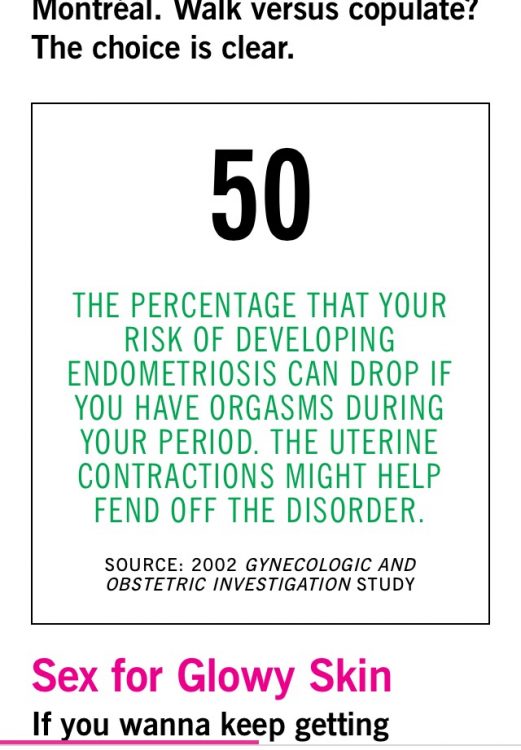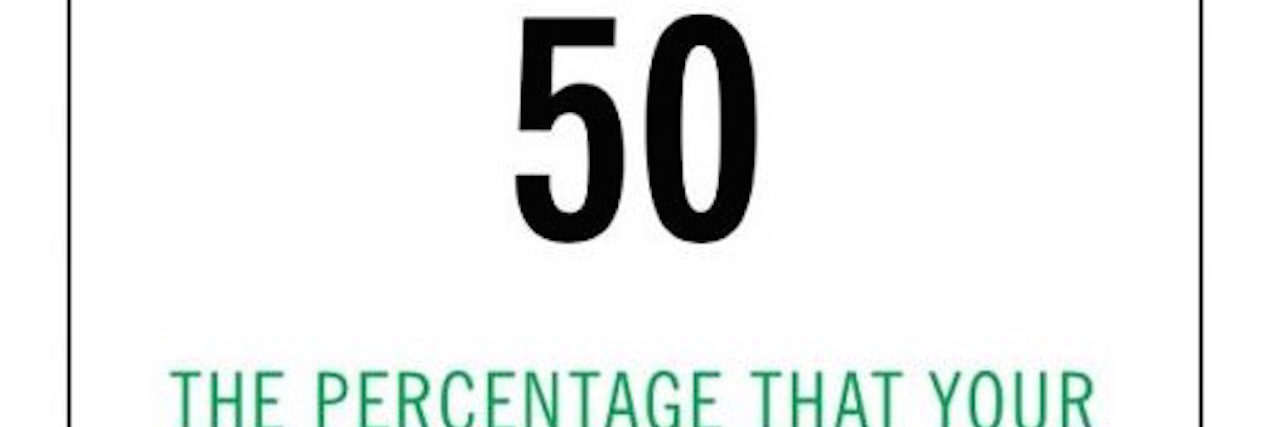Women in the US opened their copy of Cosmopolitan magazine this month to find the shocking statistic that they could reduce their chances of getting endometriosis by 50 percent if they orgasm during their periods.

Wow. Could I have stopped this hellish pain and fatigue by simply orgasming during my period? Could I have stopped the condition that causes me pain every time I have sex by simply orgasming more in the first place?
No. Because it’s nonsense. This is a statistic from a 15-year-old study that was widely rebutted at the time. Here is a great letter from Heather Guidone and Michelle Marvel of The Endometriosis Research Center doing just that.
I know from working as a journalist before I became too unwell to do so, and from being part of various chronic illness advocate communities, that the research that hits the news is not always the research of the highest quality. It is often the research that makes a sexy headline.
This means that “You can stop yourself getting endometriosis by orgasming during your periods” is more likely to be splashed across the front page of a newspaper than “Endometrium found outside the uterus in fetuses.”
And then, unfortunately, the communities are subjected to this research forever as the media digs out these stats whenever they want to find a sexy statistic.
But this isn’t just harmless fun. An estimated one in 10 women have endometriosis. But diagnosis takes a long time. Many of Cosmopolitan’s readers are probably suffering in silence, not knowing that their symptoms are not normal and that they already have endometriosis.
And it’s not just women of reproductive age. Girls as young as 8 have been diagnosed with endometriosis. Should we be telling these girls they should be having more orgasms?
I myself have known that orgasms during my periods are really painful since about the age of 16. It wasn’t the orgasm itself, but any method of getting there caused me a lot of pain.
And I’m not alone. I now know this to be a hallmark symptom of endometriosis, i.e. the very thing that this statistic tells us we should be doing is actually the very thing many of us cannot do.
This is actually very key to one of problems with the assumptions made in this research. The letter from the Endometriosis Research Centre I linked to above asks, “Do painful symptoms of endometriosis occur because women with the disease do not… engage in intercourse during menses, or do those women not… engage in intercourse because they have endometriosis and painful symptoms prevent them from doing so?”
In short, correlation does not equal causation. The reason women who do not orgasm during their periods go on to be diagnosed with endometriosis may well be because they avoid this very activity because it already causes them pain.
Statistics like this not only put out false information to women worried about endometriosis, but it also puts a feeling of blame on those who are diagnosed.
Even if this statistic was true, could I have stopped myself getting endometriosis by orgasming during my time of the month? Let’s break this down. It hurt me at 16 when I tried this for the first time. It no doubt hurt me before this but I didn’t know.
So, while I didn’t find this out for another 13 years, I already had the first symptoms of endometriosis at this age. So we have to go back further if I were to prevent it.
My periods started at age 12. Should I have been orgasming during my periods at such a young age? Is it my fault I didn’t masturbate or have sex when I hadn’t yet figured out what the hell an orgasm was?
No. Even if this statistic was correct, it would not be my fault. But do the girls eagerly buying a “grown-up magazine” and the women with family members with endometriosis or worrying about their ever-growing pain know that?
Do the women writhing in pain every month, or even all the way through the month know that this information is false? Will they feel guilty that their suffering was in some way self-inflicted or, at the very least, could have been prevented?
There is a huge need for informative articles about endometriosis to be published. So many women suffer in silence because they don’t know their suffering is not normal.
So, Cosmopolitan writers and editors, if you are reading this, please apologize and publish a retraction of this statistic. But, if I could ask one more thing of you, please also publish some factual information to help the one in 10 of your readers who have endometriosis identify the symptoms, find out what the disease actually means, and what they can do if think they might have it.
You can find detailed factual-based information on endometriosis on the following websites: Endopaedia and Pacific Endometriosis.
And if you are reading this and are worried you may have endometriosis, or have found out you do but don’t know where to get help, as well as reading the above websites, I’d highly recommend joining Nancy’s Nook Facebook Group, an educational resource for women to find the information to pursue the treatment they need, started by endometriosis advocate Nancy Petersen.
We want to hear your story. Become a Mighty contributor here.

